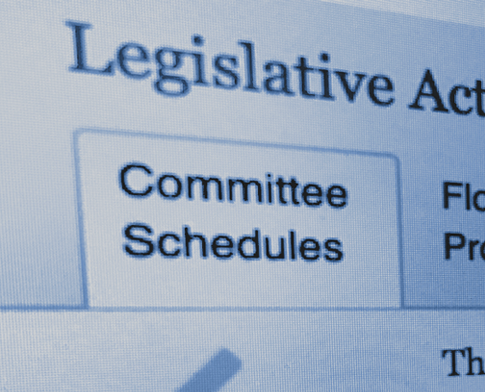Energy Update (May 12)
Senate EPW Advances Major Water Bills
On Wednesday (May 6), the Senate Environment and Public Works Committee approved two bipartisan water bills, the “Drinking Water Infrastructure Act of 2020” and “America’s Water Infrastructure Act of 2020.”
The water infrastructure bill would provide $17 billion in new authorizations for the Environmental Protection Agency (EPA) and Army Corps of Engineers projects and programs, deepen ports, maintain navigability of inland waterways, fix aging dams and irrigation systems, and upgrade wastewater systems across the nation. The bill would also boost water storage in the west and improve flood management in the midwest and includes language that would push the Army Corps to take just two years to complete its feasibility studies for potential projects.
The drinking water bill would provide $2.5 billion in federal authorizations to help communities ensure drinking water is safe and would reauthorize the Safe Drinking Water Emergency Fund. The bill would also require 20 percent of drinking water revolving funds to be used on grants, no-interest loans, or debt relief for water systems.
Democrats on the committee voted in support of the legislation but noted a few concerns with the bills. Ranking Member Tom Carper (D-DE) said they want to ensure many types of ports receive balanced distribution from the Harbor Maintenance Trust Fund. He also added that Democrats want progress on an amendment from Sen. Kirsten Gillibrand (D-NY) that asks EPA to set effluent limits and pretreatment standards under the Clean Water Act.
“Forcing water ratepayers to pay to remove the PFAS from their drinking water and providing taxpayer funding to clean up contaminated sites are efforts made less effective if we don’t also take steps to reduce the amount of PFAS being released into our environment in the first place,” Carper said.
Senator Kevin Cramer (R-ND) proposed an amendment that would have codified the practice of not requiring a water supply contract as part of granting users access to Army Corps reservoirs in western states, but it was voted down.
EPW Democrats and Republicans said they were looking to reach a compromise similar to the Senate version of last year’s National Defense Authorization Act.
Chairman John Barrasso (R-WY) said these bills are “ideal compliments to the bipartisan highway bill” the committee has already reported with a unanimous vote. Many members on the committee emphasized these bills could be a part of a sweeping infrastructure package that could be included in a post-pandemic economic recovery.[1]
Mixed Signals on Oil Help
According to industry officials, the Trump administration’s plans to offer aid to oil companies at risk of collapse appear to be “waning” now that the free-fall in crude prices has paused. The administration appears to instead be focusing on the role of states in addressing the fallout of the oil market meltdown, rather than the federal government.
Oil futures have doubled since the end of last month, but still remain around $20 a barrel for contracts with deliveries through the end of the year. This is about half of what most companies that produce oil from prolific shale fields in Texas, New Mexico, and North Dakota need to break even.
Industry officials told POLITICO there seems to be no new initiatives to help oil and gas companies due to plans by the Treasury Department to allow the Federal Reserve to relax restrictions on buying debt from companies with poor credit ratings.
Treasury Secretary Steve Mnuchin and Energy Secretary Dan Brouillette are still exploring an emergency lending program for oil and gas companies. It is not yet clear whether the tweaks to the Federal Reserve’s Main Street lending program will provide much help to mid-size oil and gas companies.[2]
As workplaces begin to open up, U.S. gasoline demand is starting to rebound from the 40 percent decline seen in consumption mid-April.
Senate Republicans have indicated they would push hard in the next coronavirus package to include Sen. John Hoeven (R-ND)’s legislation, S. 3597, that would provide $3 billion to fill the Strategic Petroleum Reserve.
Potential Tax Credit Extensions
The Trump administration signaled on Thursday (May 7) that it would extend deadlines for renewable developers to claim key federal tax credits. The Treasury Department is planning to issue rules that grant wind and solar developers an extra year to complete their projects amid the coronavirus pandemic.
The production tax credit and investment tax credit provide a chief source of financing for wind and solar projects. Currently, developers can claim the credits if a project is placed in service within four years of construction.
Senator Chuck Grassley (R-IA) led a bipartisan letter to Treasury Secretary Steve Mnuchin last month asking for the extension, and Treasury Principal Deputy Assistant Secretary for Legislative Affairs Frederick Vaughan responded that the department “plans to modify the relevant rules in the near future.”
The coronavirus pandemic has caused vast economic disruptions to the renewable industry. According to researchers at Wood Mackenzie, the solar industry residential market could shrink by 16 percent to 34 percent. The wind industry has warned nearly one-third of its workforce could be lost, along with about half of new projects under construction or in advanced development.[3]
To view Grassley’s letter to Mnuchin, click here.
Republican Lawmakers Send Letter on Fossil Fuel Financing
On Friday (May 8), three dozen Republican lawmakers sent a letter to President Trump urging the administration to “use every administrative and regulatory tool at your disposal to prevent America’s financial institutions from discriminating against America’s energy sector while they simultaneously enjoy the benefits of federal government programs.”
The letter was sent in response to a wave of announcements from financial institutions that said they will no longer fund coal developments or oil drilling operations in places like the Arctic.
The lawmakers said that the banks should not be able to benefit from the CARES Act if they rule out funding for the sector. Signatories of the letter include Republican leaders from the Senate EPW and Budget committees, as well as the House Energy and Commerce and Natural Resources committees.[4]
To view the letter, click here.
Democratic Lawmakers Push Back on Fossil Fuel Aid
On Tuesday (May 5), Democratic lawmakers introduced legislation that would prohibit fossil fuel companies from participating in any coronavirus relief packages, and shut down a number of options that are currently under consideration by the Trump administration to aid the oil and gas industry.
The bill specifically would ban fossil fuel companies from participating in the Federal Reserve’s Main Street lending program, block the Interior Department’s authority to cut royalty rates, cap the Strategic Petroleum Reserve at its current physical capacity, and prohibit financial institutions that take part in CARES Act implementation from making investments in fossil fuel projects for two years.[5]
Senator Jeff Merkley (D-OR) led companion legislation in the Senate. To view a fact sheet on the legislation, click here.
References
[1] Hannah Northey, “Committee sends 2 infrastructure bills to Senate floor.” Greenwire, 6 May 2020. https://link.edgepilot.com/s/3fe44a71/VSybOSyQGEGAK-XVNqMyfw?u=https://www.eenews.net/greenwire/stories/1063065545
[2] Colman, Zack; Adragna, Anthony; & Lefebvre, Ben. “Whie House takes foot off gas on oil industry aid.” Politic Pro, 8 May 2020. https://link.edgepilot.com/s/5ab40370/jYfvDcTGXkCn2MXBcI3MLA?u=https://subscriber.politicopro.com/article/2020/05/white-house-takes-foot-off-gas-on-oil-industry-aid-1933685
[3] Iaconangelo, David. “Trump admin throws tax lifelines to renewables.” Energywire, 8 May 2020. https://link.edgepilot.com/s/93dd4acd/D9wfUPgbqk2wQRZKVnR2lg?u=https://www.eenews.net/energywire/2020/05/08/stories/1063077635
[4] Adragna, Anthony. “GOP lawmakers press Trump to hit banks that shun fossil fuels.” Politico Pro, 8 May 2020. https://link.edgepilot.com/s/a8ff4934/sZ2jB333Q0G1ITAlA415aA?u=https://subscriber.politicopro.com/article/2020/05/gop-lawmakers-press-trump-to-hit-banks-that-shun-fossil-fuels-1934380
[5] Adragna, Anthony. “Democrats week to bar fossil fuel help in federal Covid-19 relief.” Politico Pro, 5 May 2020. https://link.edgepilot.com/s/add0b7b3/2dVUTqIB_EG2TopLQwCGmg?u=https://subscriber.politicopro.com/article/2020/05/democrats-seek-to-bar-fossil-fuel-help-in-federal-covid-19-relief-3980130
HOUSE.GOV
The Week Ahead
For the main events of the next week and more, go straight to the key events on the house.gov website.
SENATE.GOV
The Week Ahead
For the main events of the next week and more, go straight to the key events on the senate.gov website.


